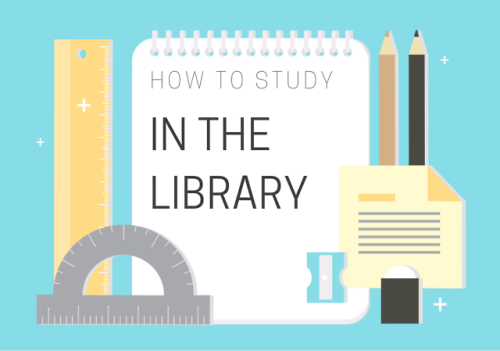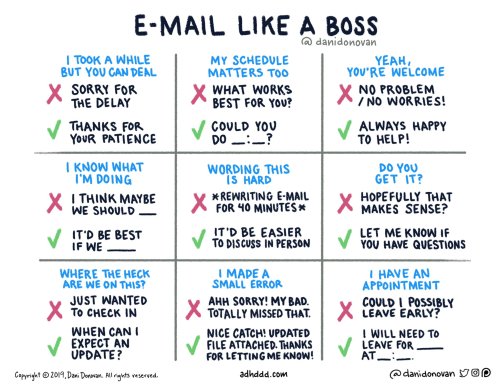Planning Your Study Session

If you’re anything like me, you go to the library with the best intentions then inevitably get distracted and wind up finishing none of the tasks you set out to do. Here’s a handy guide to how to get more done when you go to the library!
Planning your study session
Know what you’re doing ahead of time. Not only does this mean you can plan out your time to keep you on task, but you can also pare down which books and notes you need to bring.
Try and choose subjects that you need to be in the library for. For instance, if you need books to write an essay, read them in the library so you don’t have to drag them home. It’s better for your back, and more motivating when your time is limited!
Make a plan! Whether it’s just a to-do list or chunking your work into ten minute blocks, have goals to accomplish and keep yourself on task.
Don’t expect to be fully focused the whole time you’re there. No one can concentrate for 4 hours straight, so work some breaks into your plan and cut yourself some slack.
What to bring
A water bottle. You’re better off staying hydrated with water than sugary drinks from the vending machine, and bringing your own bottle is the best way to do that because you can keep it right at your desk.
Your chargers! Nothing cuts a study session short like your computer dying, so be prepared and make sure you’ve got your laptop/phone/tablet charger on hand.
A jacket. At least at my university, the library is almost always freezing. Even if yours isn’t, bring a jacket to keep you warm because sitting still for ages is a surefire way to cool you down!
Healthy snacks. Bringing your own food means you won’t be spending money, and you have a reason to stay at your desk and away from the vending machine. It also means no noisy crisp packets! Here’s a guide to library-friendly quiet snacks.
Headphones. Sometimes, even the library can be a bit noisy. Whether you’d prefer silence or some light music, having headphones can help you out.
Study essentials. Don’t depend on the library having copies of your required textbook, so bring your own from home, alongside essentials like pens & paper!
Making the most of the library
Don’t sit on the ground floor. It’s the loudest and busiest, and the place where you’re most likely to run into friends or get distracted, so avoid it off the bat. Similarly, stay away from high traffic areas like the loos, printers, and cafe.
Use the resources available! The library offers so much more than books: research databases, primary sources, librarians, and even audio resources if you’re a languages student like me. Make the most of all that’s on offer!
Get there early. Especially in exam season, the library fills up pretty fast and that can prevent you from sitting where you would usually. If you want a prime spot, your best bet is to get there when the library opens.
Try booking a study room. They can be great for working on group projects or if you want to snag a one person room and work with even fewer distractions.
Remember that the library doesn’t guarantee productivity. You still need to be prepared and focused, regardless of the location! Try and ditch the rest of the day’s worries at the door and just concentrate on work.
Other tips & tricks
How To Effectively Study In A Library from The Happy Arkansan
Library Study Session Tips & Essentials from Bookish & Bright
How to have a Productive Library Study Session from Macarons & Mascara
Packing List for Studying in the Library from Life As A Dare
How to Study Efficiently and Effectively
Home vs. Library: Finding a Study Spot from Survive Law
More Posts from Charlies-day-off and Others
me whenever anybody says that they like me/that i’m their friend

Executive Dysfunction & ADHD study tips! 😙 🌷 😘
I’ve collected study tips from myself and others who struggle with studying. Here’s a masterlist of strategies people use to help :) For those curious, #3 is my personal favourite and is probably the main reason I didn’t flunk all of my classes this year. Feel free to add your own!
Sleep, eat, exercise. The basics. Treating my body right helps me keep a routine and makes me less prone to impulsivity. This makes it a little easier for me to do the things I need to do and fight back my executive dysfunction.
Play idle games while working. Anonymous says “I get bored very, very quickly and need constant stimulation, so every time I have to wait for something, I will immediately divert my attention. Having an idle game running helps me not to lose too much focus, so I get more work done as a result.”
Use a tutor. Since I can’t follow self-imposed deadlines, I create external deadlines by booking tutoring appointments. This forces me to make sure I have at least a basic understand of the material before the session so I know what to go over. Most schools have free peer tutors available, so take advantage (if your school doesn’t, try a study group)! This is a great way to create deadlines you can follow, and it always helps to study with someone who can answer your questions and keep you on task.
Play music. @luminarily says “Sometimes I sit in silence and I get bored of it or I get a song stuck in my head or something. But I have forcibly linked music playlist and actually doing something I need to do so that when I put on music I am automatically forced to do the work I was supposed to do. So it makes the work and the listening more enjoyable both and it’s easier to stay on task… I use unpaid youtube on my phone so I can’t leave the tab or else I can’t listen to music anymore so I can’t go on my phone. And also youtube mobile lets you set watch time timers, so when my music stops I take a break and don’t burn out!”.
Play ambient noise. Similar to #4. I am not stimulated enough when taking notes, reading textbooks, etc., but listening to music can be too much and makes me stressed. I like to play ambient noise (my personal nerdy fave is Slytherin dormitory ambience on Youtube lol). It’s enough to stimulate my brain, but not overpowering to where I get distracted or stressed.
Block out time to do work. @tidal-rose says “I find it easy to do stuff by saying ‘I’ll do it tomorrow.’ But I don’t mean the procrastinate-y ‘I’ll do it tomorrow,’ I mean plan to do it tomorrow. Set aside a block of time when you are going to do nothing but the task. …I just realized this sounds like such a neurotypical answer oh gosh. It really does work to hack my executive disfunction”
Have a plan. If I don’t have a straightforward + actionable plan for right when I wake up, I will just do literally nothing all day. I have to know what I’m going to be doing when I wake up, like “shower, be at the library by 10am, and do practise problems there”. If I only have a vague plan like “study chemistry tomorrow” it’s a lot harder for me to do anything.
Start small. It often feels impossible to do even the bare minimum. When I can’t even get myself to write a single sentence of my paper, I try to do even less than that. Literally just open up a Word document. Even just opening up a blank page is a fantastic start, and starting is the hardest part.
Change locations. The longer I sit in one space putting off an assignment and stewing there in my anxiety about it, the harder it is to start. So I move. Even if I just go from my desk to the floor. Sometimes this can change my headspace enough to make it easier to do what I need to.

I think the key to a happy life as an adult woman is to channel your inner weird little girl and make her happy
Literally just romanticize your own life. What’s stopping you. Who will care. Commit to enjoying things.
HOW DO I STUDY FOR _____________
So I think this might be the question I get asked the MOST often. People are always asking me how do I study for this or that class. So I thought I would just make a master post I could link you all to. :)
All classes
Watch my video on how to study. This applies to almost everything you have to study.
See below for additions to doing everything listed in that video.
Math
Do problems. Do all the problems. Do them again.
Do all the problems in your book.
Get another book and repeat step 2
Trust me 99.9% of all math classes is pattern recognition. If you can learn how to solve the problem you can ace any set of variables they throw at you.
Physics
See math–because physics is JUST applied math. You have to learn how to read the questions and pull out the information you need–the only way to do that is to do dozens of questions!
Micro Bio/ID
Flow charts–break things up by group to understand them. You have to group things to remember what’s gram positive or gram negative
Don’t blow off the actual micro part of micro. If you understand the virulence factors you’re more likely to understand the sx/tx
I had to use a lot of silly sayings to remember all the little pieces of micro. So I would remind myself about the diseases of haemophilus influenzae by saying haEMOPhilus (epiglotitus, meningitis, otitis media, pnuemonia). It was silly but it worked for me.
O Chem
Do all the problems. Do them again.
Get another book and repeat step 1
Flashcard the reactions you don’t understand–put the reactants on one side and the products on the back. Practice these backward and forward.
Draw out every step of reactions you don’t understand
Circle your electrons or mark whatever it is you lose track of
Count–count where everything went at the end to make sure you didn’t screw up.
Categorize. Do all members of this group react this way?? It’s easier to learn the rules and the exceptions than force memorize every individual compound’s reaction.
Gen Chem
See math
Understand real world examples. I related all of the stuff about heat to a cup of coffee. It worked for me
Talk through it! I had to read chemistry out loud or try to repeat it out loud in my own words to have any idea what was going on.
YouTube videos are absolutely perfect for gen chem!! (There’s even a whole CrashCourse series on Gen Chem that’s appropriate especially for high school level chem).
General Biology–Genetics/Immunology/Cell Biologyetc
You really need to watch my video
Cross relate–you have to integrate all your biology together to keep all that information in your head.
Flashcard only the stuff that can’t be understood. (Like cell markers, etc)
Charts! Biology is all about categorization and understanding the similarities between different groups of things. If you can simply remember the characteristics of a group it’s easy to know everything you need to about all the members of that group.
Pathology
Pathoma
Look at the pictures until you feel sick.
Make flashcards of the pictures so you can at least do immediate identification of what you’re looking at even if you don’t know exactly what the pathology is.
Integrate! How does the physiology relate to exactly what is going on with the pathology? How does the pathology predict treatment?
Learn some latin and greek root words. Even if you have no idea what the word means you might be able to figure it out from there. :) I’ve gotten more than one question right by just figuring out what the word meant.
Pharmacology
Understand the mechanism of the drug–it will really predict how it is used or what its toxicities are for
Flashcard the bare minimum or anything bizarre you can’t remember any other way.
Figure out the similarities in the names. If it sounds the same, it probably belongs in the same class.
Don’t learn in isolation. It’s hard to study pharmacology on its own–instead study it integrated with physiology and pathology whenever possible for the best understanding.
Study as case studies!! What diuretics would you give to a patient with CHF? With ESLD?
Biochemistry
Charts–get poster boards or tape together a ton of sheets of paper and try to write out every pathway you can to see how it all is integrated.
Always track the flow of energy!! Where is your NAD/ATP/etc?
Group pathways by the “point”. Are you destroying carbohydrates or building fats? How does this compare to other pathways that do the same thing?
Try to rewrite the pathways from memory then see what you missed.
Anatomy
Spend a bunch of time with the specimens if you have access to them.
DRAW even if you suck at drawing
Learn the clinical correlations–why do you care
Thing about everything in relationship to one another!
Do questions!! Grey’s has a student question book I recommend.
I’ll probably add more to this list as I go and as more of you ask for specific subject advice, but here you go!!
When in doubt, always ask yourself “how would this be asked on a test?”. If you could write a test question about it, you should definitely know it!
And always remember that you should study for understanding and not just for a grade–always be learning and not memorizing. It’s more important you understand the material than you get the A!!
Happy studying!
DO IT FOR HER
(her being you )
worst part of adulthood so far is definitely the fact that people have the ability to contact me and i have to respond in a timely manner
being tired all the time is such a mystery.... is it anaemia? vitamin d deficiency? chronic fatigue syndrome? depression? insomnia?? is it just the crushing weight of being alive in a capitalist society??? someone cure me






pictures like these always make me want to cry
-
 tmedic liked this · 1 year ago
tmedic liked this · 1 year ago -
 fairylighttea reblogged this · 1 year ago
fairylighttea reblogged this · 1 year ago -
 thejoshlange liked this · 1 year ago
thejoshlange liked this · 1 year ago -
 cassettestoredayde liked this · 1 year ago
cassettestoredayde liked this · 1 year ago -
 sadis-gate liked this · 1 year ago
sadis-gate liked this · 1 year ago -
 m-marrs liked this · 1 year ago
m-marrs liked this · 1 year ago -
 sofiliwi liked this · 1 year ago
sofiliwi liked this · 1 year ago -
 blooblimp liked this · 1 year ago
blooblimp liked this · 1 year ago -
 r-kentatsu reblogged this · 1 year ago
r-kentatsu reblogged this · 1 year ago -
 doc-in-progress reblogged this · 1 year ago
doc-in-progress reblogged this · 1 year ago -
 anisotropic liked this · 1 year ago
anisotropic liked this · 1 year ago -
 saileshcreates liked this · 2 years ago
saileshcreates liked this · 2 years ago -
 josmiths liked this · 2 years ago
josmiths liked this · 2 years ago -
 doc-in-progress reblogged this · 2 years ago
doc-in-progress reblogged this · 2 years ago -
 dentistnewmanalapan liked this · 2 years ago
dentistnewmanalapan liked this · 2 years ago -
 hadesdipheolisk liked this · 2 years ago
hadesdipheolisk liked this · 2 years ago -
 josieeverafter liked this · 2 years ago
josieeverafter liked this · 2 years ago -
 axyridis18 liked this · 2 years ago
axyridis18 liked this · 2 years ago -
 idlehood reblogged this · 2 years ago
idlehood reblogged this · 2 years ago -
 staradinen liked this · 2 years ago
staradinen liked this · 2 years ago -
 midmayseldestchild liked this · 3 years ago
midmayseldestchild liked this · 3 years ago -
 homeisaplaceinthehills liked this · 3 years ago
homeisaplaceinthehills liked this · 3 years ago -
 melody-studyblr liked this · 3 years ago
melody-studyblr liked this · 3 years ago -
 gatheryepens reblogged this · 3 years ago
gatheryepens reblogged this · 3 years ago -
 mtmoreau liked this · 3 years ago
mtmoreau liked this · 3 years ago -
 smekala reblogged this · 3 years ago
smekala reblogged this · 3 years ago -
 ms-marylinmonroe liked this · 3 years ago
ms-marylinmonroe liked this · 3 years ago -
 kingsmadrid liked this · 3 years ago
kingsmadrid liked this · 3 years ago

Waddup my name is Charlie, im 21, and i never fucking learned how to study.
241 posts